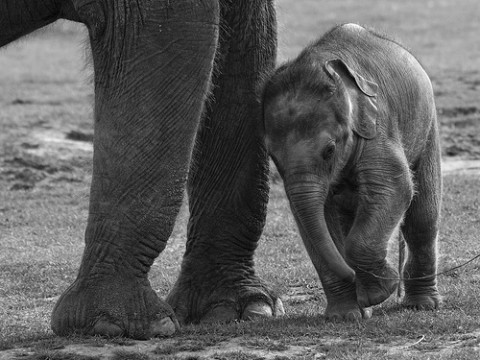Elephants on Strings (and Other Mind Tricks)
May 25, 2011 Leave a commentA friend recently relayed the following story about how some baby elephants are tamed, for cirucuses and other forms of work. As part of its training, the baby is tied it to a steel stake in the ground, strong enough to prevent it from breaking free when it tries to do so. Eventually, the elephant will give up and stop trying to escape. I imagine that this is not the complete story, but keeping with this trajectory . . . At a certain point, the trainer can replace the steel stake with a smaller wooden one, despite the fact that it would never hold the elephant if it tried to break free. An elephant trained to believe that the stake is strong will not try to break loose and run.
Perhaps this sounds crazy, and yet there are many situations in which we tame the wildness out of other species, one another, and ourselves, in more or less subtle ways. All in the name of what? Control, I suppose. Maintaining power and privilege. Trying to render the world more predictable and safe. This metaphor of elephant training is powerful to me, both with respect to what it suggests about conditioning in our own lives and work, and especially in situations where it could be relatively easy liberate ourselves.
Of course there are a variety of restraining forces at play in our lives and minds, of varying degrees of rootedness and resistance: how we were parented, educated, and other structural/institutional arrangements that privilege certain ways of seeing, being, and doing; our own beliefs about ourselves and others; the particular perspective we have given where we sit in different systems; our conscious or unconscious choice to access only certain parts of our individual or collective potential; the instinctual remnants of our distant pasts that no longer serve us or suit our current conditions or future trajectory . . .
So to the extent that this metaphor can serve us, I see it reminding us to:
- Acknowledge and see the stakes to which we are tied and that define our range of physical, emotional, intellectual, spiritual, and social movement.
- Try to better understand the nature of these stakes. Of what are they constituted, and how deeply rooted are they?
- Where we are so moved, push ourselves and adjust effort accordingly. Surely elephants know there is strength in numbers.
And curious hear what you see here.

No Comments
Curtis – thanks again! This is a story often recounted by my own spiritual teacher, it is part of her relentless effort to point her students to their true nature – “you are so much more than you think are!”
I’m appreciating your questions. When I read your invitation to “acknowledge and see the stakes to which we are tied” I am reminded of how challenging – or perhaps impossible – that can be.
One way to see is to listen to those who might know more as they tell us of what they have seen – this is my own experience with my teacher.
But perhaps a more accessible way to see is by taking a rigorous look at what we take to be “true.” The nature of race, the inevitability of the state, how much we can love, the list is endless. Taking a close and rigorous look, we might then ask “What else is true?”
This simple and most important question was offered to us by one of the participants at our Walk Out Walk On book party and it has struck a powerful chord. This, I think, is the question that starts to let see the stakes we are tied to.
Thanks, G. And it’s just striking me, on the heels of doing a segment of this Whole Measures workshop, that there is an apt double entendre in the word “stake.” To which stakes and interests are we most devoted?
Curtis…Very powerful concept! We are tied to so mamy “stakes” in the commercial world as well as in our cultural lives…it feels daunting to even begin naming them all. I’m writing a speech entitled “What Would Thomas Edison Be Doing Today?” and it’s prompting me to really look closely at the boundaries you’re calling forward here.
One of our biggest “stakes” is our educational system. Edison was home-schooled and largely self-taught. We are still very tied to learning things in steps rather than in wholes…and it greatly reduces our learning potential.
Curtis – good points and yet I cannot get beyond the illustration of the bound elephant. I wonder how often one of these captives turns on the capture and pile drives him/her headfirst into the ground, tent-stake style? Clearly not often enough to discourage the practice of enslaving these animals.
Maybe what we ought to do, instead of trying to “nice” our way into the future we seek, is rip out those stakes and drive them through the hearts of the vampires who feed off the status quo?
Just a thought from the Justice side of Social Justice.
Charlie, appreciating the fire in your belly. And when those stakes are more systemic in nature the blame game is harder to play.
And that you, Sarah, for your insights. Adding to the comments you make about education, I would say that there are many ways that we are not educated about the processes in which we swim that are disempowering, disabling, and do little to bring out our best collective selves and facilitate evolutionary development. That’s part of my passion here at IISC, to help people see that water in which they swim, to understand how they might be more explicit and intentional about being social architects in the name of a better future!